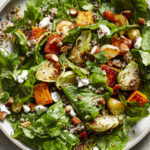simple food facts for you.
Sometimes I go off on a tangent on this blog. This is one of those times. I have read many articles on food and food science recently and compiled a bit of what I learned. Here are 10 (people loves numbered lists) food truths that you might not know, I even sited some research to back up the points.
- Processed food is processed food even if the label says “Organic”. If you look at some soups, meal replacement bars, crackers, or canned foods in the store the ingredients are very similar to the non-organic. A better choice would be to eat the whole, single ingredient food. Buy organic if you can swing it, but don’t be fooled by the use of the “O” word. Sometimes the O is just the second letter in “nO different”.
- If you like yogurt, eat full fat yogurt. Low fat yogurt is processed to remove the fat and substitute it with other ingredients, like sugar or high fructose corn syrup or artificial sweeteners. I read a study that showed that people who consume high fat dairy products were often less likely to be obese. This fat, as it turns out can be relatively harmless.
 Make your own salad dressing. Since most people are under the impression that they are eating healthier when they eat a salad, but then because they don’t like salad, so they cover it in dressing. Many commercial salad dressings contain HFCS or substitute soybean oil for olive oil. Soybean oil has been shown to cause inflammation due to high levels of Omega 6 fatty acid. So, don’t be fooled when you have a salad, and as always: read your ingredients.
Make your own salad dressing. Since most people are under the impression that they are eating healthier when they eat a salad, but then because they don’t like salad, so they cover it in dressing. Many commercial salad dressings contain HFCS or substitute soybean oil for olive oil. Soybean oil has been shown to cause inflammation due to high levels of Omega 6 fatty acid. So, don’t be fooled when you have a salad, and as always: read your ingredients.- Fruit juice is not as good as fruit. Many fruit juices contain little or no real juice. I love the commercial that says their juice contains “10% real fruit juice!”which translates as 90% NOT JUICE. But even “real fruit juices” contain a lot of sugar. Best course of action is to just eat fruit, that way you also get the fiber benefit. Most fructose in soda or juices is processed by the body as “just another sugar” and, though it’s natural, it can still be un-good for you. Real fruit contains things beyond fructose that makes it a great source of natural sugar. Advice: skip the fruit juice and eat the fruit.
- Diet soda has never shown to help people lose weight. When people chose to replace soda with diet soda they haven’t really found a good plan to shed weight. Often the replacement of sugar with artificial sweeteners leads to stimulated appetites and that is never a good idea when trying to lose a few pounds. Yes, you might know someone who did lose weight when they made the switch, but it’s likely that they also changed other things in their diets and so they did see some beneficial changes. It’s still unlikely that it was because of the change to diet pop.
- Eating breakfast cereal is not a good start to the day. Most cereals, at least the ones that kids like, are full of refined sugars and refined carbohydrates. Eating this first in the morning will usually cause a spike in blood sugar and a crash a few hours later.
- Granola is not really granola. Real granola is nuts and oats or other grains. Today’s granola bars are mixed with fillers like sugar and oil, they include chocolate chunks or have a gooey caramel drizzle. Don’t fool yourself, granola is good, but what we all eat is not likely granola.
- Whole wheat bread is only slightly better than white bread. The problem comes in that most whole grain breads are made with grains that are so refined that the body processes it all too easily and it still spikes blood sugar. If you want healthier bread choose the kind that literally has whole grains. These are usually ones with oat flakes, nuts, or other chunky ingredients.
- It is possible to drink too much water. There is a condition called hyponatremia that indicates that a person is either drinking water too fast or consuming more than needed in a day. Symptoms like headaches, cramping, fatigue, swelling in hands, feet, or lips, or even nausea can occur. If you always carry a water bottle, wake up in the middle if the night to pee, or have totally clear urine, you might need to slow it down. Water is great for us, but all things in moderation, right.
- Only 1% of people are really diagnosed with Celiac Disease and need to remove Gluten from their diets, the rest just “want” to reduce their gluten intake and tell everyone that they are intolerant of Gluten. Now-a-days there are many places that serve Gluten free food and it’s available in the aisles of many grocery stores. The problem is that much of the GF food contains a lot of sugars, highly refined carbs or other chemicals. People would do better to try to eliminate foods with those descriptions before they chase off the Gluten. But if they do want to eat GF, replace Gluten foods with naturally Gluten free food like Quinoa or Flaxseed, because bad food with or without Gluten is still bad food.

